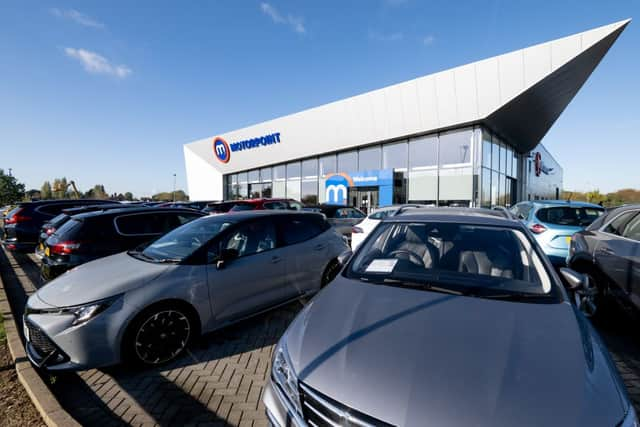Over half of motorists with older cars are holding on to them for longer as living costs rise


The survey of 2,000 UK drivers with cars over 10 years old revealed 57 per cent will keep their car for longer due to worries about the current financial situation.
However, running an older car has, in some cases, caused some motorists financial anguish, with 10 per cent claiming some repair bills have run into the thousands .
Advertisement
Hide AdAdvertisement
Hide AdWhile nearly one in 10 aren’t sure how much their ageing car has set them back.
And 21 per cent reckon they’ve spent more on repairs in any given year than they think their entire car is actually worth.
But 64 per cent said unexpected car repair bills cause them stress, while 44 per cent had experienced two or more surprise bills over the last 12 months.
Almost a third (31 per cent) have had a bill of £400 or more in the past year for an unanticipated but essential maintenance item, while 10 per cent have had a single bill of £1,000 or more.
Advertisement
Hide AdAdvertisement
Hide AdWhen their beloved old banger conked out, 35 per cent admitted to taking it out on the car itself, by giving the door a boot or whacking the steering wheel.
It also emerged 43 per cent suspect it may be more economical to buy and run a newer car, than keep maintaining their older one.
Loading....
Choosing the best finance option for you
Mark Carpenter, CEO at nearly new vehicle retailer Motorpoint, which commissioned the research, said: "It's important when budgeting for a new car to consider maintenance costs, which will be required throughout its life.
"In the current climate, many motorists will look to weigh up the pros of hanging on to an older car, which they may own outright, with financing a newer one that may meet their needs for additional space, lower emissions, improved economy, and safety equipment.
Advertisement
Hide AdAdvertisement
Hide Ad“For those with a vehicle that has become unpredictable, or changing needs such as a growing family, it is important to understand the options available such as a fixed monthly payment and a vehicle with warranty protection to manage repair bills, and to be sure this is affordable.”
The study also found 36 per cent of respondents claim a lack of awareness of car finance options has seen them hang onto an old car, rather than upgrade it.
Almost half (46 per cent) plan to replace their car within the next three years, and 25 per cent will use finance to purchase it.
For 26 per cent, they are not sure whether they will pay cash or use finance to spread the cost, but 23 per cent would be more open to using finance if they had someone to explain the options to them.
And 58 per cent find car finance terms confusing.
Advertisement
Hide AdAdvertisement
Hide AdFor people who do foresee a change on their driveway, 57 per cent will go for something pre-owned but newer than their current one, according to OnePoll figures.
Lower running costs (24 per cent), improved reliability (13 per cent) and just wanting a change (seven per cent) were the top reasons people would consider switching their older car.


Sticking to your budget
Mark Carpenter added: “If you have identified a need to change your car, it’s important to thoroughly examine your budget and stick to what is affordable, including if your circumstances change.
“Car finance terms can be confusing and knowing the difference between the options might seem like a bit of a minefield at first.
Advertisement
Hide AdAdvertisement
Hide Ad"We’d always advise doing your research, either online, over the phone or by speaking to an advisor in person.
“Once you’ve set a budget, using an online finance calculator is often the quickest way to determine the right finance route for your circumstances, for example the deposit size, monthly payment, the length of the finance agreement and annual mileage.
“Finally, any additional products such as extended warranty should be factored into the overall budget.
“These require extra initial outlay, however they can help avoid unexpected costs further down the line.”
Advertisement
Hide AdAdvertisement
Hide AdMotorpoint partnered with automotive presenter Natisha Chatten, who runs the channel @auto_social_uk on Instagram to compile a series of top tips for those planning their next car purchase.
Natisha Chatten said: “Making sure you’re aware of all the pros and cons of different types of car finance depending on your personal circumstances is the first step to making the right purchase.
“Having one set payment can be more affordable if it means the car is more suited to your needs, so this is worth considering as part of your decision.”
Deciphering key car finance terms - What they mean
- GMFV - if you opt to purchase a vehicle by PCP, Guaranteed Minimum Future Value is an estimate of what a vehicle will be worth at the end of the contract.
- When the PCP contract ends, this can be paid either as a lump sum or refinanced to secure ownership of the vehicle.
- APR - Annual Percentage Rate takes into account yearly interest added to a sum borrowed to buy a car or other item.
This rate will be fixed for the duration of the agreement.
Automotive presenter Natisha Chatten’s top tips on how to financially plan for your next car purchase
Is it financially viable to change your car?
If your repair bills start to out-weigh the cost of a new model it might be time for a new car.
Advertisement
Hide AdAdvertisement
Hide AdWrite a list consisting of the costs of maintenance, tax, fuel, and insurance – and see how they might compare to a newer model.
Where should you buy your used car?
On the surface, buying privately often appears to be the cheaper option but the seller won’t have put the car through a rigorous inspection, nor will they offer a warranty.
So whilst the original outlay is less, it could come with costly implications further down the line.
Don’t forget to check the running costs
Don’t get hung up on engine size alone - modern engines often can get more power from smaller and smaller engines, so remember to research the power and fuel economy of your next model.
Advertisement
Hide AdAdvertisement
Hide AdDon’t overspend on monthly payments
As a rule of thumb, you should only spend 10 to 15 per cent of your net income on your car’s monthly payments.
Knowing exactly what you can afford to pay for a car can be empowering and help you identify the vehicles which are within your budget before car shopping.
Paying for your car in cash
This method means you can sell the car at any time, you don’t have to worry about monthly repayments, and you have no mileage limitations.
And there is no record of it on your finance agreement.
On the downside, you’re placing all your cash into a depreciating asset and your credit score won’t be improved by managing a loan responsibly.
Advertisement
Hide AdAdvertisement
Hide AdUsing personal loans
These are a good option if you can’t afford to buy a car outright – and as with cash, you have the option of selling the car whenever you like and no mileage limitations.
Loans can sometimes be cheaper ways of borrowing than other methods – particularly if you’ve got a good credit score, which can be boosted further if you keep on top of repayments.
However, loans are not always linked to the car, therefore failure to make payments may result in other assets being repossessed.
Hire purchases (HP)
Also known as HP Finance, this allows you to secure a loan against the car you’re purchasing – these are often easier to get accepted for and you have no mileage limitations.
Advertisement
Hide AdAdvertisement
Hide AdThe cost is spread with fixed regular monthly repayments, after which you own the car outright – and if you’re responsible with loan repayments, this can help build your credit score.
This method is often subject to a 10 per cent initial payment and it can have a higher APR rate than personal loans.
Personal contract purchase (PCP)
Most commonly used for newer cars, this is a loan secured against the vehicle, which you pay back through monthly repayments with added interest.
With the loan taking into account depreciation of the car based on how many miles you expect to drive.
Advertisement
Hide AdAdvertisement
Hide AdZero deposit deals are often available, and you can continue with a new car on a similar monthly fee every two to four years - you don't automatically own the car once the loan term has ended.
At that point you can give the car back to the dealer and walk away or pay one final payment - often called a balloon payment - in order to keep the car.
But you could be charged for damage to the vehicle.